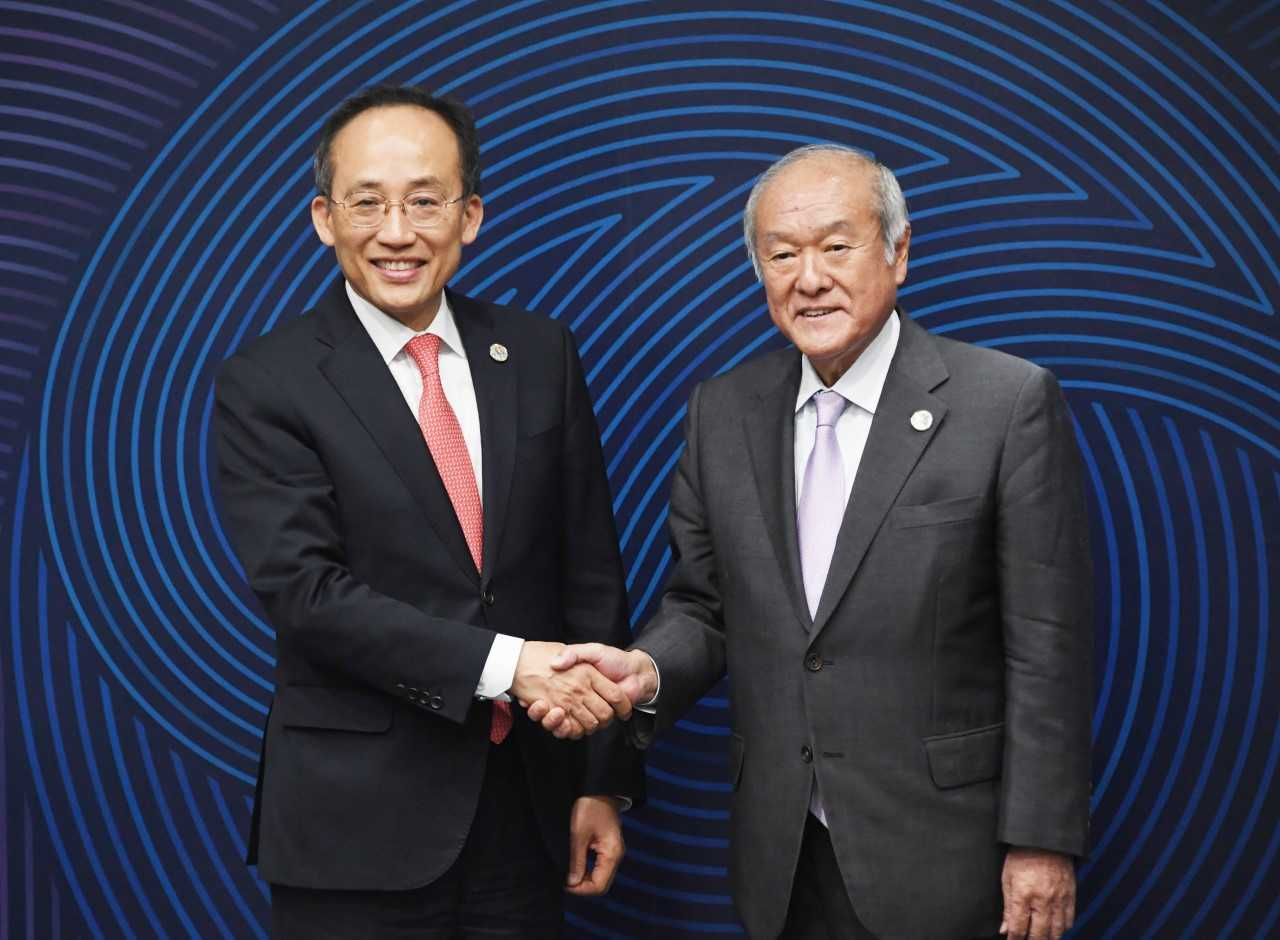Finance minister urges Japan to restore Korea's trade status
By Im Eun-byelPublished : May 2, 2023 - 15:36

INCHEON -- Finance Minister Choo Kyung-ho called for Japan to put South Korea back on its "white list" of trusted trading partners in a swift manner and expand cultural and educational exchange between the two countries during his meeting with his Japanese counterpart, Shunichi Suzuki.
The two met on the sidelines of the 56th Annual Meeting of the Board of Governors of the Asian Development Bank which kicked off Tuesday for a four-day run in Incheon’s Songdo district.
On April 24, Seoul reinstated Tokyo to its list, which allows for simplified procedures in the purchase of sensitive goods that can be diverted for military use. Japan began its domestic procedures to follow suit for the reinstatement of Korea to its own list, but the exact timeline is yet to be confirmed.
"Bilateral cooperation is ongoing following the Korea-Japan summit,” Choo said, referring to President Yoon Suk Yeol's visit to Tokyo in March to hold a summit with Japanese Prime Minister Fumio Kishida.
"Shuttle diplomacy between Korea and Japan has been restored after 12 years," said Choo, noting that the relationship between the two countries has entered into "a new era," with Japan inviting Korea to attend the G-7 meeting of financial ministers.
Suzuki, on the other hand, placed more emphasis on the geopolitical risks that Korea and Japan share.
“Korea and Japan are important neighbors who have to cooperate with each other to respond to the diverse agenda of the world economy, regional and international community,” Suzuki said.
“The two countries have to join hands to respond to geopolitical risks such as North Korea’s nuclear armament and Russia’s invasion of Ukraine,” Suzuki noted, echoing Choo's sentiments on the need for cooperation in the areas of personnel, science and technology and international affairs.
It was the first time in seven years that the two top economic policymakers of Korea and Japan held such talks. The two agreed to hold a meeting this year in Japan with a more official agenda.
At a separate meeting held by the finance ministers and governors of Korea, China and Japan, Choo said, “The trilateral cooperation of Korea, China and Japan can be the engine for the rapid, sustainable recovery of the world economy."
China's finance minister and the head of the People's Bank of China did not attend the meeting and instead were represented by their deputies.
“Korea, China and Japan take up more than 20 percent of the world economy, and over 80 percent of the economy of the Association of Southeast Asian Nations Plus Three,” Choo said, referring to the international entity consisting of the 10 ASEAN member states along with South Korea, China and Japan.
“With the global economy at an important inflection point, the trilateral cooperation between Korea, Japan and China has become more important,” Choo said.
Meanwhile, the ADB announced its new Innovative Finance Facility for Climate in Asia and the Pacific (IF-CAP) program designated to combat climate change.
According to the ADB, more than 40 percent of climate-related disasters that have occurred after 2000 happened in Asia and the Pacific.
Under the program, South Korea, Denmark, Japan, Sweden, the United Kingdom and the US will finance climate change-related projects in the region via a leveraged guarantee mechanism.
“Climate change is the critical issue of our lifetime and here in Asia and the Pacific we are on the front line of that battle,” ADB President Masatsugu Asakawa said at a press conference.
“IF-CAP is an exciting, innovative program that will have a real impact. And it is another example of how ADB serves as the climate bank for Asia and the Pacific.”
Asakawa said he remains optimistic on the outlook for the Korean economy.
"Growth is forecast at 1.5 percent this year and is expected to rise to 2.2 percent next year. It will be supported mainly by domestic consumption, with contributions from exports and investments," he said at a press conference.
The first day of the ADB was followed by a meeting of finance ministers and governors from the ASEAN Plus Three. The top officials discussed ways to strengthen the Chiang Mai Initiative, a multilateral currency swap arrangement among the 13 member states, which stands at a total of $240 billion.
The joint statement released after the meeting showed the participants agreed to continue discussions with the aim of improving the CMI’s accessibility and effectiveness as a financing option, by renewing its operational guidelines.




![[KH Explains] No more 'Michael' at Kakao Games](http://res.heraldm.com/phpwas/restmb_idxmake.php?idx=644&simg=/content/image/2024/04/28/20240428050183_0.jpg&u=20240428180321)




![[Grace Kao] Hybe vs. Ador: Inspiration, imitation and plagiarism](http://res.heraldm.com/phpwas/restmb_idxmake.php?idx=644&simg=/content/image/2024/04/28/20240428050220_0.jpg&u=)









